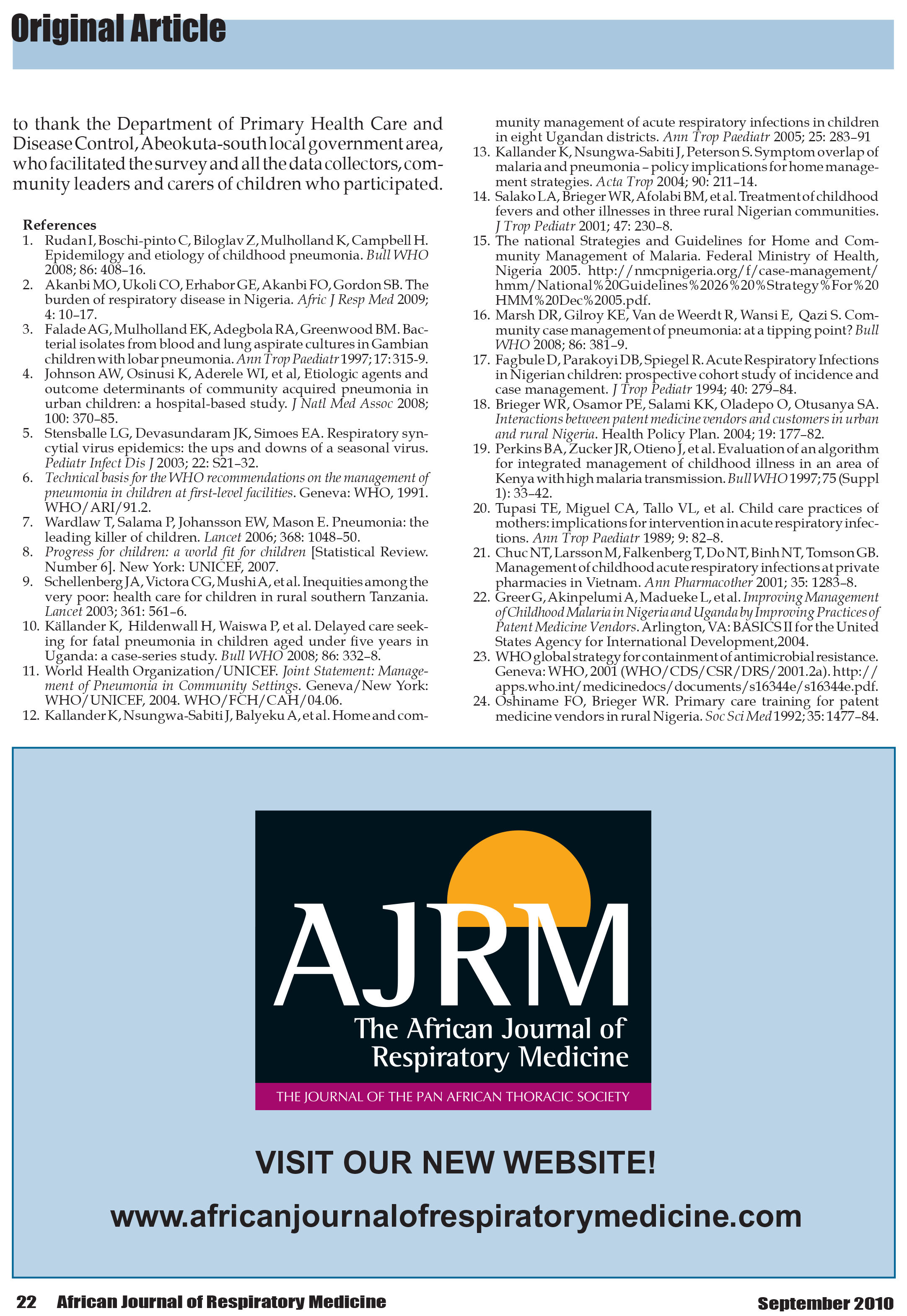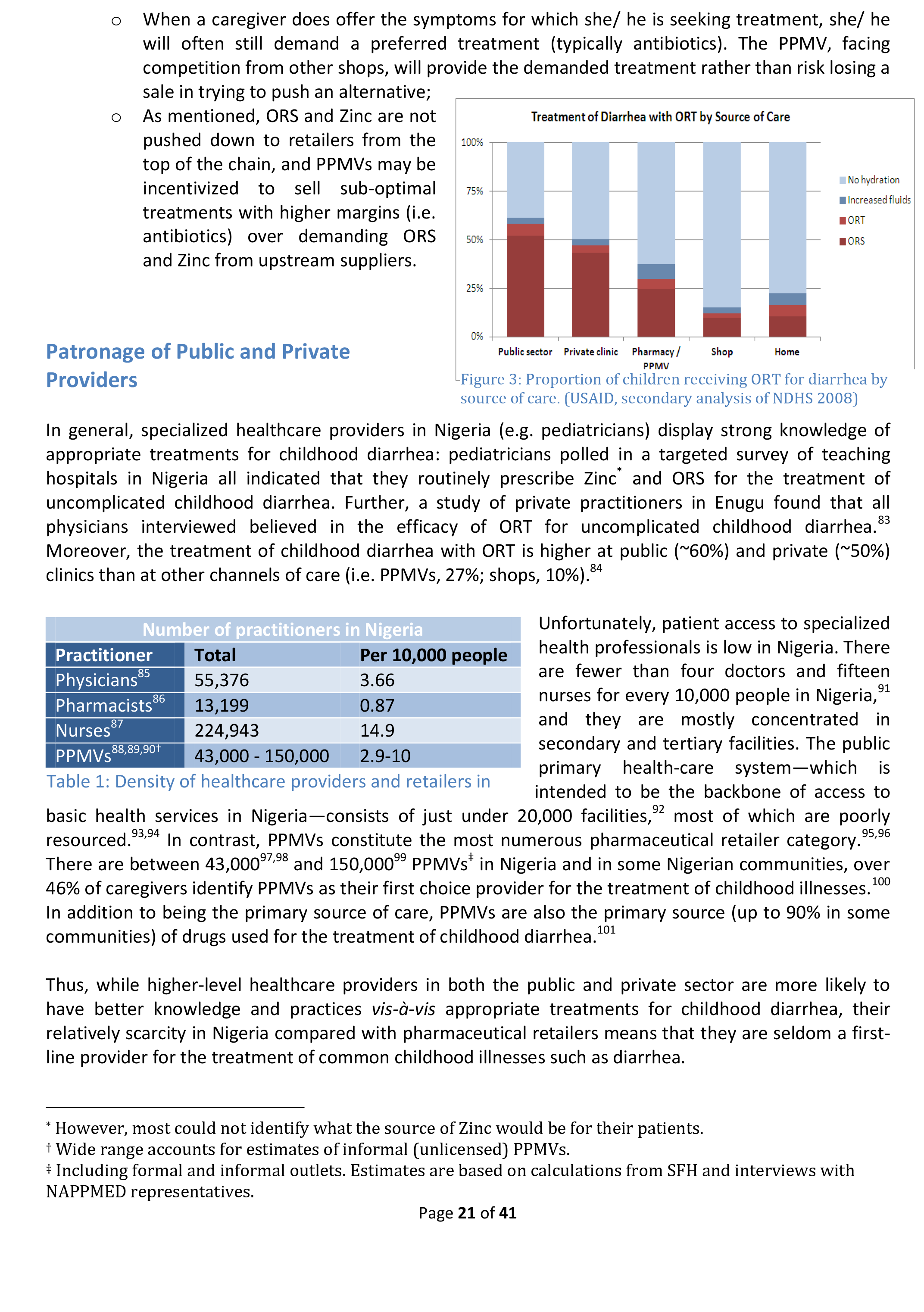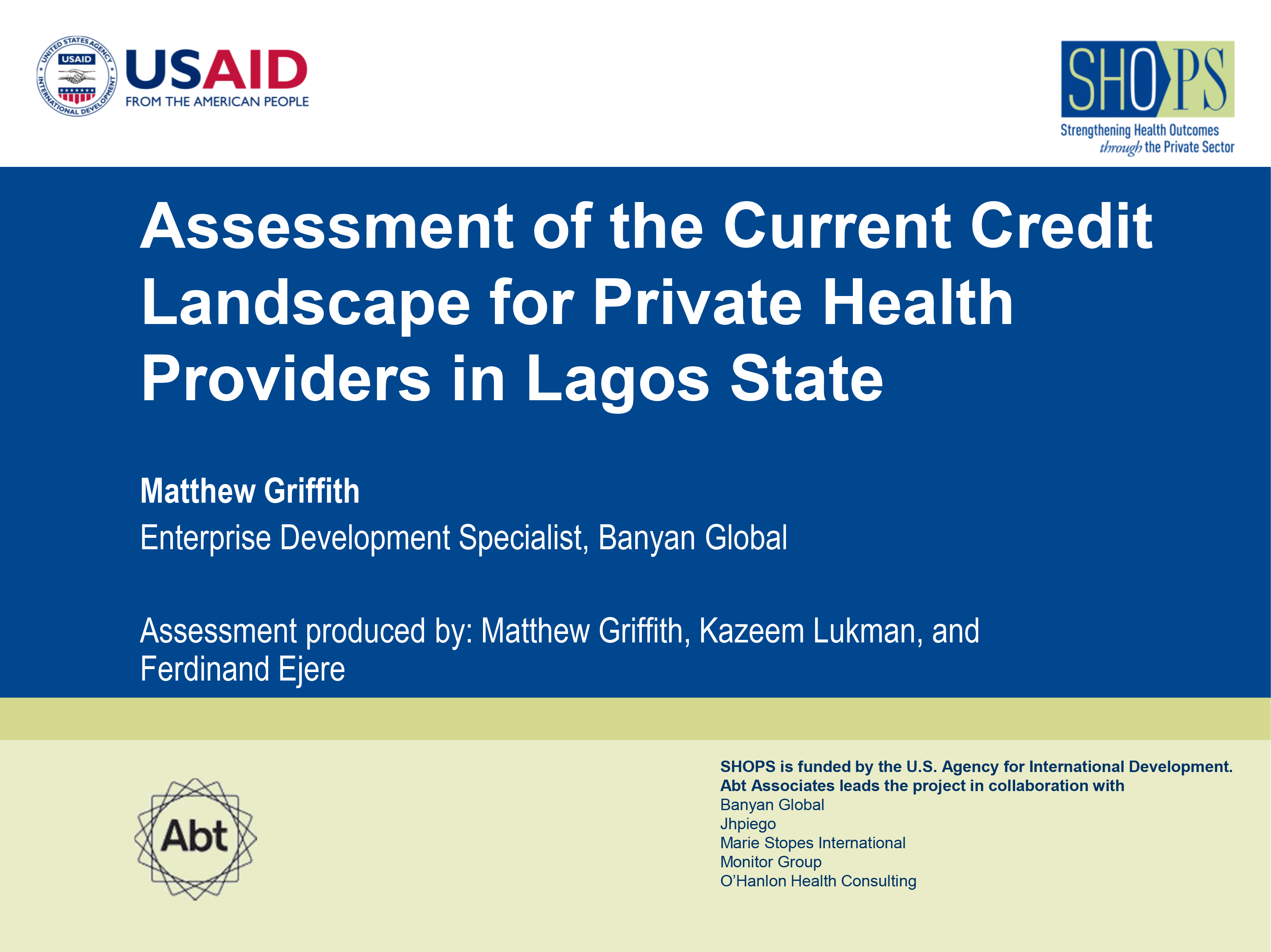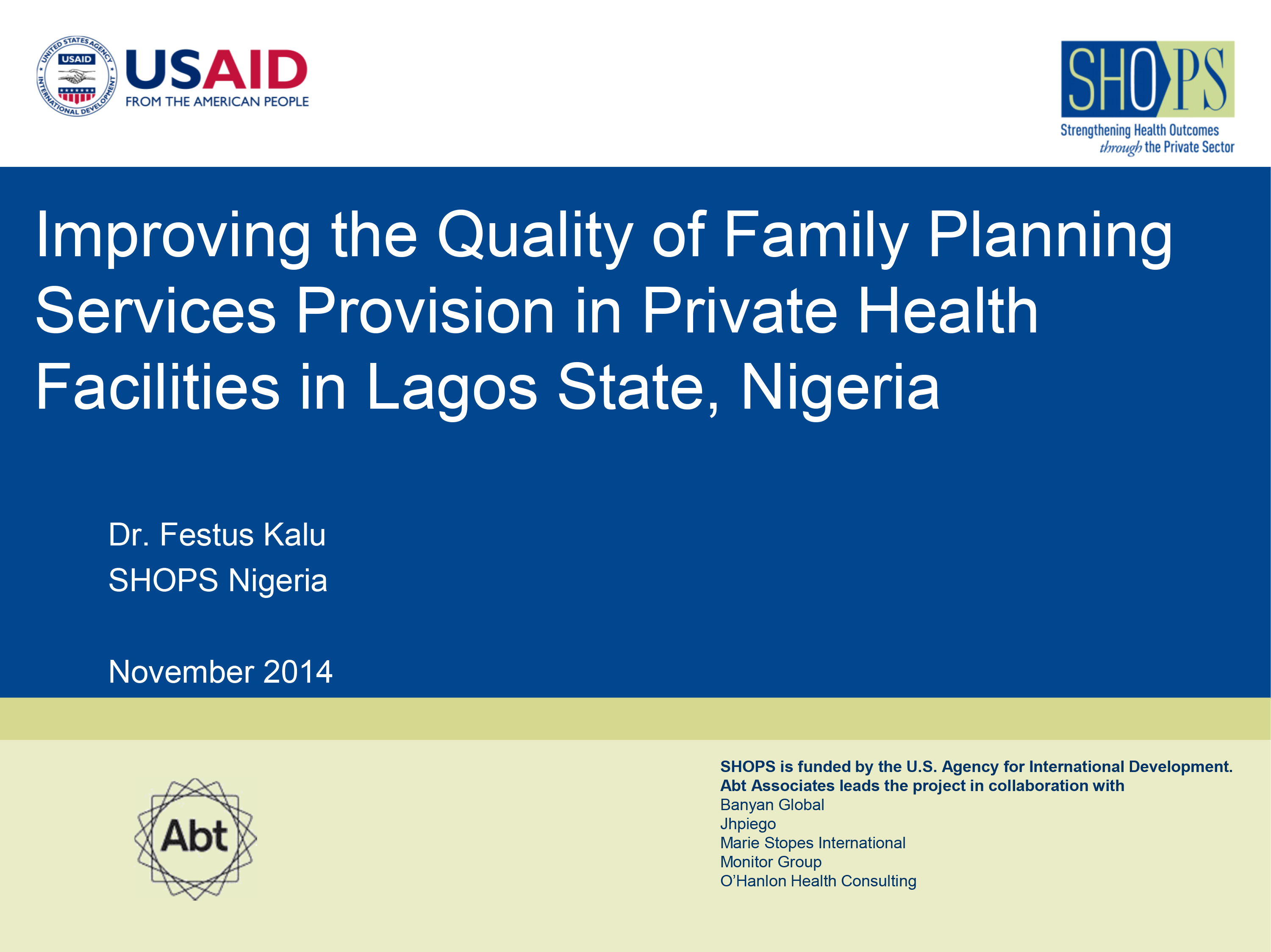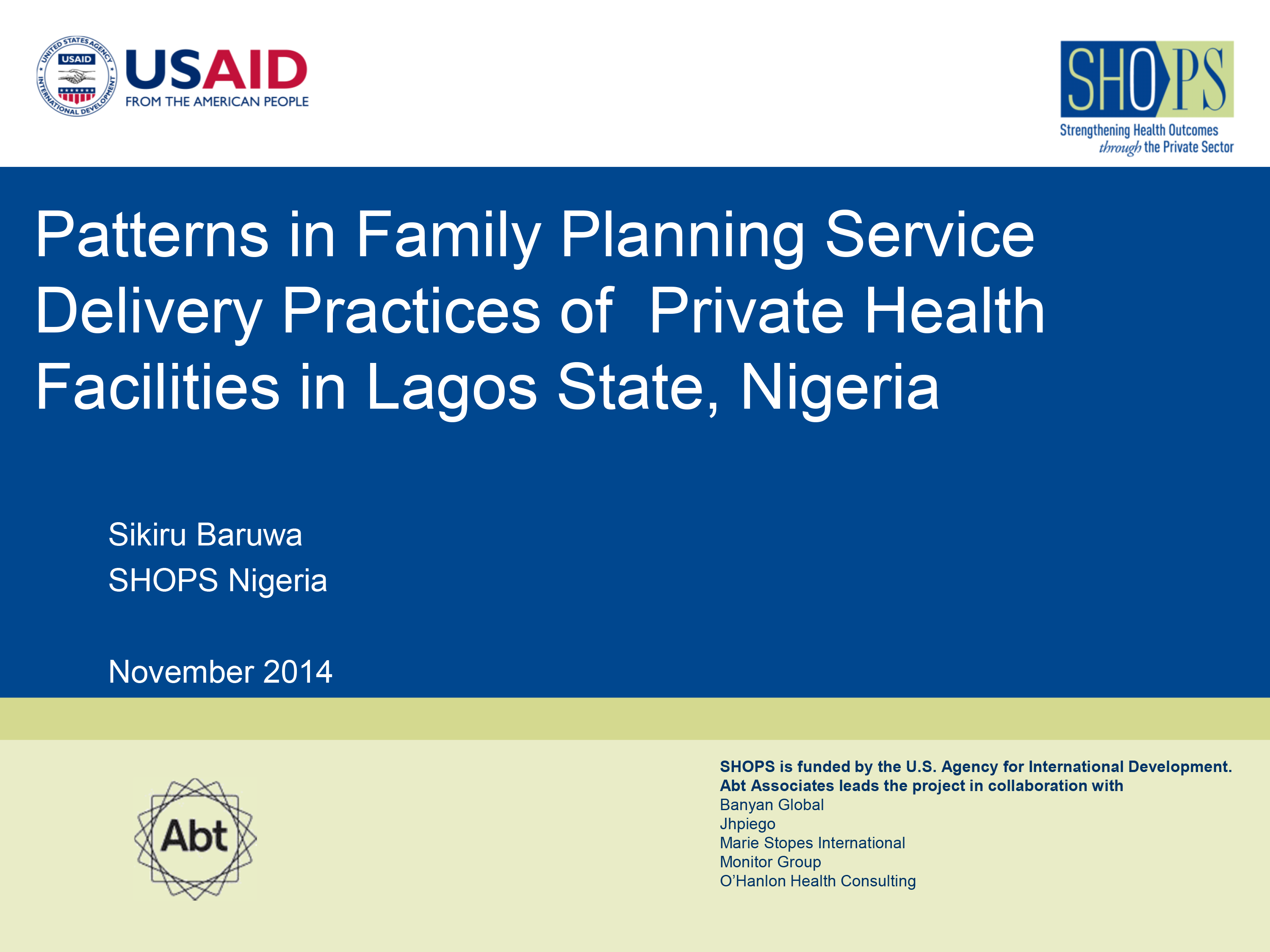
Resource Library
Acute Diarrhoea: Mother's Knowledge of ORT and Its Usage in Ibadan Metropolis, Nigeria
This paper explores indigenous Nigerian perceptions of childhood diarrhoea and its treatment pattern among health care givers in Ibadan metropolis. Furthermore, the paper also addresses the cultural interpretations of dehydration and the perceptions of oral rehydration therapy (ORT). It is suggested that in promoting the use of ORT by the Nigerian government and other collaborative international agencies, the socio-cultural context of the people should be taken into consideration in designing appropriate intervention strategies.
Resource Type : Brief
Country : Nigeria
Year : 2010-04-01T00:00:00
Language : English
Project : SHOPS

Resource Library
Improving caregivers' home management of common childhood illnesses through community level interventions
The study obtained information using quantitative and qualitative techniques, on key home management practices of common childhood illnesses in Community-Integrated Management of Childhood Illnesses (C-IMCI) and non-C-IMCI implemented local government areas (LGAs) in Osun state in Nigeria, to determine if any differences existed between them. Data analysis was done using Epi-info version 6.0 for the quantitative survey and content analysis method for the qualitative survey. Findings revealed better key home management practices in the C-IMCI compliant LGA than in the non-CIMCI compliant LGA. The proportion of caregivers who gave appropriate home treatment for malaria during their children's illnesses differed significantly (p = 0.000) between the two LGAs. Similarly, caregivers from the compliant LGA demonstrated better treatment practices for diarrhoea and cough. Community Resource Persons (CORPs) were the major source of information on these key practices in the compliant LGA; while in the non-compliant LGA, the traditional healers, elders, and to a lesser extent, health workers gave information. Findings showed that the C-IMCI strategy improved caregivers' home management of common childhood illnesses.
Resource Type : Brief
Country : Nigeria
Year : 2010-09-14T00:00:00
Language : English
Project : SHOPS

Resource Library
Drug treatment of common childhood symptoms in Nnewi: what mothers do?
The objective of the study was to determine how mothers treat common childhood symptoms before hospital attendance in Nnewi.
Information was obtained from 211 consecutive mothers on their children's presenting symptoms, drugs administered, source of the drugs, persons who prescribed the drugs, number of drugs administered, prior to hospital attendance through a structured questionnaire administered by the authors.
A combination of fever, cough and catarrh topped the list of presenting symptoms in 87 (41%) of the patients while fever and diarrhea had the least frequency of 16 (7.6%). One hundred and five or 52% of the mothers decided on the drugs that were administered followed by patent medicine dealers who
accounted for 59 or 29.2%. Trained health professionals whom mothers consulted before bringing their children to hospital were responsible for 28 (13.8%) of the prescriptions. Patent medicine stores were the sources of 90.6% of the drugs while health facilities accounted for 8.4%. The frequency chart of prescribed drugs were analgesics 166 (34.9%), hematinics 88 (18.5%), antibiotics and antimalarials 81 (17.1%) and 74 (15.6%) respectively while antidiarrheoals and ORT were least administered with 7 (1.5%) and 1 (0.2%) respectively. The children received an average of 2.7 drugs per prescription.
With the high prescription rate of mothers for sick children at home, there is need for effective methods to educate mothers on the use and potential dangers of home medication.
Resource Type : Brief
Country : Nigeria
Year : 2005-06-08T00:00:00
Language : English
Project : SHOPS

Resource Library
Pre-hospital management of diarrhoea among caregivers presenting at a tertiary health institution: implications for practice and health education
Diarrhoeal diseases cause significant childhood morbidity and mortality worldwide. The effectiveness of home management of diarrhoeal diseases is achievable only if caregivers have appropriate information despite varying recommendations on the strategies for diarrhoea therapy. The objective of this study is to evaluate caregivers’ perception and use of ORT fluids for management of diarrhoea in under-five age children in the face of varying phases of recommendations, as an indicator of home treatment. Caregivers of U5 children presenting with acute watery diarrhoea to different Paediatrics clinics/wards of the University of Nigeria Teaching Hospital (U.N.T.H.), Enugu between October 2006 and February 2007 were interviewed with a structured questionnaire. Caregivers of 156 under-five children who met the inclusion criteria were recruited. Access to ORT fluids was high with 73.1% of all children with diarrhoea being offered an ORT fluid at home. However, the method of preparation and administration of fluids was quite unsatisfactory. Previous experience with ORT fluids, higher educational or socioeconomic status did not correlate significantly with better performance. Despite high level of knowledge and acceptance of ORT among the study population actual practice was not satisfactory. Diverse practices by caregivers which represent the various phases of evolution in the types of fluids promoted for oral rehydration reflect some confusion that require urgent attention. Knowledge and skills of ORT need to be widely promoted on a continuing basis with the need for health workers to ensure that caregivers are taught and adhere to the correct recommendations on oral rehydration therapy.
Resource Type : Brief
Country : Nigeria
Year : 2011-03-01T00:00:00
Language : English
Project : SHOPS

Resource Library
Home management of acute respiratory infections in a Nigerian district
Globally, over 2 million children die annually from acute respiratory infections (ARIs) especially pneumonia. ARI symptoms (cough and difficult/fast breathing) frequently overlap with those of malaria. In Nigeria, children with these pneumonia symptoms are frequently overlooked by the home management strategy that seeks to treat all childhood fevers as malaria.
The aim of the study was to determine the prevalence of overlap of fever and ARI symptoms, the timeliness of care-seeking and the type of care sought for ARI with or without fever at community level.
From a district, 420 households with 420 children aged over 5 years who had been sick with cough within 2 weeks of the survey were selected through systematic random sampling and their carer interviewed about the child’s illness. Of the 413 children who had been sick with cough, 21% reported overlapping symptoms of fever, cough and difficult/fast breathing (DFB). Of these, 27% received antimalarials alone. Sixty percent of children with ARI received antibiotics and 59% received care within 24 hours of symptom recognition. Carers of infants and children with DFB were more likely to seek care within 24 hours of symptom recognition (both p <0.001). Most (45%) of the antibiotics used were obtained from patent medicine dealers.
It was concluded that a large percentage of children have malaria and pneumonia symptom overlap; and a significant proportion of these cases are mismanaged as malaria in the community. The role of patent medicine dealers in recognising and appropriately treating ARI should be explored.
Resource Type : Brief
Country : Nigeria
Year : 2010-09-01T00:00:00
Language : English
Project : SHOPS

Resource Library
Comparison of knowledge on diarrheal disease management between two types of community-based distributors in Oyo State, Nigeria
Community-based distributors (CBDs) have been trained and utilized to promote a variety of health commodities. In addition, a variety of different types of community residents have been trained ranging from traditional birth attendants (TBAs) to patent medicine vendors. A training programme for CBD agents in the Akinyele Local Government Area of Oyo State, Nigeria, provided the opportunity to compare the knowledge of two different types of CBD agents, TBAs and volunteer village health workers (VHWs). Although VHWs were younger and better educated than the TBAs, the two groups had similar levels of knowledge about diarrhea recognition, cause and prevention. It was common for the respondents to confuse diarrhea and dehydration in their answers about signs (recognition) and prevention, showing that at least they had some perception that the two conditions were connected.
Overall knowledge results showed some gaps that may likely be a natural result of knowledge
decay. The major lesson learned is that the type of CBD agent may not be as important as the fact that they receive follow-up after they have been trained.
Resource Type : Brief
Country : Nigeria
Year : 2004-01-01T00:00:00
Language : English
Project : SHOPS

Resource Library
The Private Sector Market for Diarrhea Treatment in Nigeria
This assessment informs the development of a comprehensive scale-up plan for ORS and Zinc by identifying the main barriers to increasing accessibility and uptake of appropriate diarrhea treatments through Nigeria’s private healthcare delivery sector. In particular, barriers to access and uptake were assessed at the levels of supply, distribution, and sale of treatments. Desk reviews of existing research were supplemented by analyses of population-based data and interviews with key informants in the diarrhea treatment and pharmaceutical sectors.
Resource Type : Report
Country : Nigeria
Year : 2011-11-28T00:00:00
Language : English
Project : SHOPS

Resource Library
Assessment of the Current Credit Landscape for Private Health Providers in Lagos State
This presentation examines the assessment conducted by SHOPS to gain a clear understanding the current credit landscape for private health providers, and to identify available lending products that are appropriate and beneficial for private health providers. It was made at the 3rd Nigeria Family Planning Conference in Abuja on November 26, 2014.
Resource Type : Presentation
Country : Nigeria
Year : 2014-12-03T00:00:00
Language : English
Project : SHOPS

Resource Library
Improving the Quality of Family Planning Services Provision in Private Health Facilities in Lagos State, Nigeria
This presentation focuses on improving the quality of family planning service provision in private health facilities in Lagos State, Nigeria. It discusses the prevailing quality gaps in private facilities, project interventions, visible signs of improvement in practice in the private facilities, and the effect of quality improvement on service delivery. The presentation was made at the 3rd Nigeria Family Planning Conference in Abuja on November 26, 2014.
Resource Type : Presentation
Country : Nigeria
Year : 2014-12-03T00:00:00
Language : English
Project : SHOPS

Resource Library
Patterns in Family Planning Service Delivery Practices of Private Health Facilities in Lagos State, Nigeria
This presentation examines patterns in family planning service delivery practices of private health facilities in Lagos State, Nigeria. It discusses the outcome of the survey conducted in private health facilities in Lagos State to guide the implementation of the activities. The presentation was made at the 3rd Nigeria Family Planning Conference in Abuja on November 26, 2014.
Resource Type : Presentation
Country : Nigeria
Year : 2014-12-03T00:00:00
Language : English
Project : SHOPS
Pagination
- Previous page
- Page 8
- Next page






